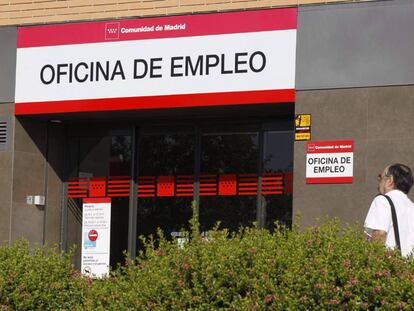A quarter of Spain’s unemployed haven’t worked for four years or more
Over the last eight years, figure rises from 100,000 to more than 1.1 million


The gradual reduction in Spain’s unemployment figures is not translating into any improvement for the country’s long-term unemployed, growing numbers of whom are being left behind: one in four jobless have been out of work for at least four years, says a report by the Fedea economic think tank based on official figures.
Between April and June of this year, 1,127,879 of Spain’s 4.5 million unemployed had not worked for at least four years, says Fedea’s Florentino Felgueros, adding that the figure has increased eleven-fold since the current recession began in 2008.
He points out that with unemployment at 20%, employers can pick and choose, and usually prefer to hire younger people who have been out of work for shorter periods of time.
One of the characteristics of the Spanish labor market is the large number of people with short-term contracts (25%)
For Spain’s long-term unemployed, the job creation of the last two years has had little impact. While joblessness hit its peak at the end of 2013, the number of people who haven’t worked in four years or more continued to grow until a year ago, reaching 1.18 million, says Felgueroso.
One of the characteristics of the Spanish labor market is the large number of people with short-term contracts (25%): rotation mitigates to some extent the instability created by high levels of unemployment, but doesn’t benefit the long-term jobless, says José Ignacio García-Pérez, a lecturer in Economics at the Pablo de Olavide University in Seville: “I study job flows in terms of hiring and lay-offs, but I see no sign of the long-term unemployed.”
“Companies look at how long people have not been working. If somebody has been out of work for more than a year, then they don’t even consider them,” says Enrique Neguerela of the regional unemployment department of Galicia. “Somebody who has been out of work for four years needs to be retrained and to be given a job immediately. Training and employment is the only way,” he adds.
Lack of skills is a major reason why so many people are unable to find work, he says, pointing out that more than 60% of long-term unemployed have no other qualifications than a high-school graduation.
Sign up for our newsletter
EL PAÍS English Edition has launched a weekly newsletter. Sign up today to receive a selection of our best stories in your inbox every Saturday morning. For full details about how to subscribe, click here
“You have to have had some kind of recent work experience,” even if it’s just been for a short period,” says García-Pérez. He’s working on a project to help the long-term unemployed find work experience. “The problem is that many of these people have only worked in the construction sector. They need retraining. Being hired by the local council to do building work isn’t going to help them. That’s a medicine that will simply make the illness worse,” he says.
But José Ignacio Pérez says that a job with the local authority, even for a short time, is better than paying people benefits or reducing their social security contributions. “Those kind of incentives don’t work, and anyway, in a lot of cases, people would have got a job anyway. If the private sector can’t help, then the public sector has to step in. We have to do something for this group, and above all, make sure that they aren’t unemployed for more than a year: if you’ve been out of work for four years and you’re aged 50 or over, then it’s almost impossible to find a job.”
English version by Nick Lyne.
Tu suscripción se está usando en otro dispositivo
¿Quieres añadir otro usuario a tu suscripción?
Si continúas leyendo en este dispositivo, no se podrá leer en el otro.
FlechaTu suscripción se está usando en otro dispositivo y solo puedes acceder a EL PAÍS desde un dispositivo a la vez.
Si quieres compartir tu cuenta, cambia tu suscripción a la modalidad Premium, así podrás añadir otro usuario. Cada uno accederá con su propia cuenta de email, lo que os permitirá personalizar vuestra experiencia en EL PAÍS.
En el caso de no saber quién está usando tu cuenta, te recomendamos cambiar tu contraseña aquí.
Si decides continuar compartiendo tu cuenta, este mensaje se mostrará en tu dispositivo y en el de la otra persona que está usando tu cuenta de forma indefinida, afectando a tu experiencia de lectura. Puedes consultar aquí los términos y condiciones de la suscripción digital.









































